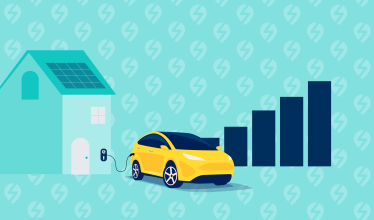Zapmap tracks UK new registrations of electric vehicles - both battery electric (BEV) and plug-in hybrid (PHEV) on a monthly basis. This data is then charted to show the cumulative number of electric cars on the road, % of the car parc and market share.
How many electric cars are there in the UK?
As of the end of March 2025, there are over 1,480,000 fully electric cars in the UK. This means that around 4.35% of the c.34 million cars on UK roads are fully electric.
The graph below shows the growth in the number of electric cars in the UK between 2021 and the start of 2025. At the end of 2021, there were 396,945 electric cars, which represented 1.2% of all cars on the road and since then the number of electric cars has increased more than three-fold.
What is the electric car market share of new cars?
So far during 2025, 120,191 new fully electric cars have been sold, which is 20.7% market share of all new cars registered this year and 35,877 more fully electric cars than were sold at the same point last year.
In 2024 there were 381,970 new fully electric cars sold, which was 19.6% market share of all new cars registered that year. More fully electric cars were sold in 2024 than any other and represented 21% more than in 2023.
In 2023 there were 314,684 electric cars sold, as compared to 267,203 in 2022; a growth of 18%. The proportion of new cars that are electric has grown from 11.6% in 2021, to 19.6% in 2024.
In the last few years the electric car proportion of new car sales has stayed stable, but this is increasing as the impact of the ZEV mandate, and growing consumer demand comes into affect. In parallel the number of new diesel cars sold has fallen significantly.
How many electric cars are sold each month?
In March 2025, 69,313 new electric cars were sold, which is a record month. This represents 19.4% of all new car registrations. Over the past 12 months the average number of new electric cars registered each month is 34,821.
As detailed on the chart below, the proportion of new electric cars has varied between 15% and 31% over this period, although in recent months it has consistently been over 20%. In the UK, March and September are new registration plate months, which accounts for peak figures, and historically, a drop in market share in these periods.
How many plug-in cars are there in the UK?
As of the end of March 2025, there were 2,292,459 plug-in cars, with over 1,480,000 battery-electric cars and over 810,000 PHEVs, registered in the UK.
Both fully electric cars and plug-in hybrids have shown substantive growth in sales over the last four years, with the overall number of cars growing from 744,823 and 2.3% of all cars in 2021 to 2,118,822 and 6.2% of all cars at the end of 2024.
There are more fully electric cars than there are plug-in hybrids on UK roads and the gap has been widening. In 2021, fully electric cars accounted for 60% of all plug-in cars but with the increase in options, range and popularity of fully electric cars, and by March 2025 this has increased to 65%.
What proportion of cars sold each month are plug-in hybrid or electric?
The proportion of all new cars sold in March 2025 that were either fully electric or plug-in hybrid is 28.9%. In March 2025 a total of 103,128 new cars with a plug were registered in the UK - 69,313 were fully electric and 33,815 were plug-in hybrids.
Electric car sales: How has the electric car market share grown over time?
At the end of 2021 just 18.6% of all new vehicles registered were electric (BEV). As of the end of 2024 this has risen to 19.6% of new car registrations. A further 8.6% of all new cars registered were plug-in hybrids, making the final market share for new cars registered with a plug in 2024 28.2%. We've seen a really positive start to 2025 with 29.9% of all new vehicles registered being fully electric or plug-in hybrids across the first quarter.
These numbers reflect both the increase in demand for electric vehicles and the decline in demand for traditional petrol and diesel cars.
How many used electric cars are sold each month?
In Q4 2024, according to the SMMT, a record 188,382 used battery electric cars were sold, which was 2.5% of all used car sales and represented a 57% increase.
How many electric vans are there in the UK?
As of the end of March 2025, there were over 82,000 electric vans (under 3.5 tons) in the UK. This represents around 1.6% of all LCVs on the road in the UK.
Whilst the van market is not growing as strongly as the car market, the graph below shows how the market has developed. At the end of 2020, there were 5,266 electric vans, just 0.12% of all vans on the road, and since then the number of electric vans has grown fifteen-fold to 82,021 and 1.6% of all LCVs.
What is the electric van market share of the new van sales market?
Since the beginning of 2025, 6,490 electric vans have been sold in the UK, 7.6% of all new van sales.
In 2024 there was the biggest annual number of electric van registrations, with over 20,500 electric vans registered, showing a growth of 1.3% on 2023.
The number of electric vans as a proportion of all new vans has increased from 1.8% in 2020 to 7.6% in 2025.
How many new electric vans are registered each month?
In March 2025, there were 3,897 electric vans registered, 7.6% of all new van sales. Over the past 12 months the average number of new electric vans registered is around 1,900.
As detailed on the chart below, the proportion of new electric vans has varied between 3.6% and 12% over this period. The peak month for electric van sales was March 2025 with 3,897 registrations.
Other data that Zapmap makes available in the public domain, and updates on a regular basis includes tracking EV charging infrastructure profile and growth, Zapmap Price Index or best networks for EV charging.
If you are interested in more detailed data and insights on the EV charging market for your business, we have much more available, find out more or get in touch with the Zapmap Insights team.
Please note that third parties can use this data provided the source is clearly attributed to Zapmap, any graphs include the Zapmap logo, and a link is added back to https://www.zap-map.com in the body of the article. The data must be strictly copied and updated manually, no automated data collection can be applied in any form. The data can only published in its original state and without any modifications.



